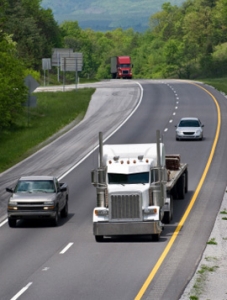 They’re called 18-wheelers. Tractor-trailers. Semi-trucks. Big rigs. These massive vehicles can weigh as much as 80,000 pounds. Every 15 minutes, a person is killed or seriously injured in a collision involving a large truck.
They’re called 18-wheelers. Tractor-trailers. Semi-trucks. Big rigs. These massive vehicles can weigh as much as 80,000 pounds. Every 15 minutes, a person is killed or seriously injured in a collision involving a large truck.
Physics of Truck/Car Collisions
At impact, a car and large truck are subject to the same force. The automobile, however, experiences higher acceleration due to its much smaller mass. (Acceleration is a change in the velocity of an object which can consist of speeding up, slowing down, or changing direction.) Sudden changes in acceleration can cause catastrophic injuries.
Truck/Car Accident Injuries
Injuries resulting from a collision with a large truck can include:
- Head/brain injuries
- Spinal cord injuries
- Neck injuries
- Back injuries
- Damaged internal organs
- Severed limbs
- Multiple bone fractures
- Severe lacerations
Factors involved in large truck accidents
There are number of factors which can contribute to a truck colliding with another vehicle.
Unsafe Driving
This can include, among other things, speeding, failure to use turn signals, following other vehicles too closely, frequent lane changes, and road rage.
Driver Fatigue
The National Transportation Safety Board (NTSB) estimates that 30%-40% of all large truck accidents involve some element of driver fatigue.
DUI
A large truck driven by someone under the influence of alcohol, street drugs, prescription drugs, and even over-the-counter medications poses serious dangers to other motorists.
Distracted Driving
Truckers who text while driving are over 23 times more likely to be involved in an accident, according to the Federal Motor Carrier Safety Association (FMCSA).
Inadequate or Improper Training
FMCSA concluded that inadequate or improper truck driver training resulted in thousands of truck accidents.
Overloading / Improper Loading of Cargo
An overloaded truck travels down a hill much faster than anticipated by the truck driver, requiring additional braking force to stop in time. Improperly distributed loads can cause the truck to be off balance leading to rollover accidents.
Faulty Equipment / Improper Maintenance
Large truck accidents can be caused by problems with components such as brakes, tires, steering, suspension, and hydraulic systems. These problems can arise from manufacturing defects or poor maintenance.
Road Conditions
A variety of road conditions can contribute to an accident. Truck drivers can encounter slippery surfaces, pot holes, poorly designed roads and confusing or insufficient signage.
Defendants in truck accident lawsuits
While the truck driver is often the most obvious defendant, there are a number of other potential defendants, including:
- Truck driver’s employer
- Owner of the truck
- Company leasing the truck
- Owner of the leasing company
- Owner of the trailer
- Company leasing the trailer
- Maintenance and repair service companies
- Freight loading contractors
- Broker of the freight and trucking company
- Manufacturer of truck, trailer, or components
- Governmental agencies responsible for road conditions
Comparative negligence
In a two-vehicle collision, it is possible that both drivers may have contributed to the accident. For example, a vehicle struck from behind by a large truck may have been driving without functioning brake lights.
Under Pennsylvania’s modified comparative negligence rule, a plaintiff can still recover damages (compensation) if his or her fault is determined to be less than 51%. Damages will be reduced by the percentage of assigned fault. A plaintiff deemed to hold 20% of the fault, would be entitled to only 80% of the compensation.
Assigning fault in multi-vehicle accidents (those involve more than two vehicles) can be a complex process.
If you or a loved one have been seriously injured in an accident involving a large truck, call the Comitz Law Firm, LLC at 570-829-1111 or email info@comitzlaw.com to speak with an experienced personal injury attorney.


